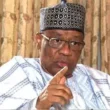Justice Abdurraheem Sayi of the Shari’ah Court of Appeal in Kwara State has stated that South-West state governments and traditional rulers have no authority to prevent Muslims from establishing and running Shari’ah arbitration panels.
Justice Sayi made this statement while delivering a lecture at the University of Lagos Muslim Alumni 30th Pre-Ramadan Lecture, held at the J.F. Ade Ajayi Auditorium on Sunday. The event, themed “The Transformative Power of Ramadan,” was attended by several dignitaries, including Lagos State Deputy Governor Obafemi Hamzat and Ogun Deputy Governor Noimot Salako.
During his lecture, Justice Sayi noted that objections to Shari’ah arbitration panels in the South-West were “legally baseless, an embarrassment to legal minds, and a mere expression of Islamophobia syndrome.” He explained that arbitration is a contractual agreement and does not require government approval.
He stated, “There’s no confusion in the Nigerian Constitution. Arbitration is by contract. Nobody needs the approval of the Federal Government to operate it. As powerful as the President is, his authority does not extend to approving the Constitution of an arbitration panel. It is purely contractual.”
Justice Sayi further noted that neither religious bodies nor traditional rulers had any legal grounds to interfere in the operation of these panels. He pointed out that different groups, including political parties, already form committees to resolve internal disputes.
He said, “We don’t need the approval of any state authority, let alone a monarch. Associations, including political parties, can establish small committees to resolve disputes involving their members. All the Muslim panels that I know of always hold their sittings inside mosques. What business do pastors or monarchs have in this matter? Somebody should tell the monarchs to know their boundaries.”
Referring to the Arbitration and Mediation Act of 2023, Justice Sayi noted that the law permits private citizens to form arbitral panels and decide their legal framework. He also pointed out that Shari’ah arbitration has already proven effective in Lagos, where some High Court judges have directed litigants to independent Shari’ah panels when conventional courts could not handle their cases.
He questioned why Muslims in Lagos, Osun, and Ogun—who form a large part of the population—are denied access to legal structures that align with their religious beliefs.
Justice Sayi clarified that Shari’ah panels do not function as substitutes for courts but operate on a voluntary basis. However, once someone participates in a proceeding, the decision reached becomes binding.
He also noted that the legal system in the South-West does not include provisions for Muslims in family law matters. He urged the region’s governments to recognize Shari’ah courts, which could handle issues such as marriage dissolution and child custody based on Islamic principles.
He said, “There is no single provision for Muslims in the family laws of the South-West. It’s as if we are second-class citizens or do not belong to these states. There is no single court in the region competent to dissolve an Islamic marriage or handle child custody cases following Islamic law. Shari’ah is a fundamental right of Muslims.”
Also speaking at the event, Professor Mashood Baderin of the School of Oriental and African Studies, University of London, delivered a lecture on “Islam at the Intersection of Humanity and Religion.”








